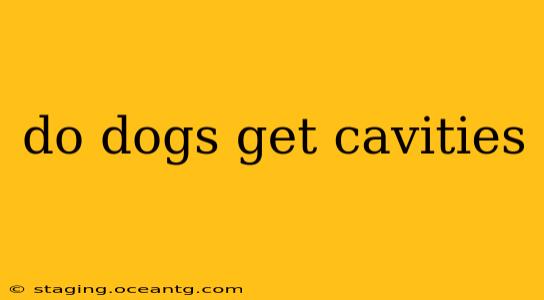While not as common as in humans, dogs can get cavities, also known as dental caries. Understanding the causes, symptoms, and prevention is crucial for maintaining your canine companion's oral health and overall well-being. This comprehensive guide will delve into the intricacies of canine cavities, answering frequently asked questions and providing valuable insights for responsible pet ownership.
What Causes Cavities in Dogs?
Cavities in dogs, like in humans, are caused by a combination of factors:
-
Bacteria: Specific bacteria in the mouth produce acids that erode tooth enamel. These acids are a byproduct of the bacteria metabolizing sugars and starches found in food particles remaining on the teeth.
-
Sugar and Starch Consumption: A diet high in sugars and starches provides ample fuel for cavity-causing bacteria. Treats, processed foods, and even certain dog foods can contribute to this problem.
-
Poor Oral Hygiene: Just like humans, dogs need regular dental care. Failure to brush their teeth allows plaque and tartar to build up, creating a breeding ground for bacteria.
-
Breed Predisposition: Certain dog breeds may have a genetic predisposition to dental issues, making them more susceptible to cavities.
-
Underlying Health Conditions: Some medical conditions can indirectly contribute to an increased risk of cavities by affecting the immune system or saliva production.
What Are the Signs of Cavities in Dogs?
Detecting cavities in dogs can be challenging, as they often don't exhibit obvious symptoms in the early stages. However, some signs to watch out for include:
-
Bad Breath: Persistent bad breath (halitosis) is a common indicator of dental problems, including cavities.
-
Changes in Eating Habits: If your dog suddenly shows reluctance to eat or chews on only one side of their mouth, it could suggest tooth pain.
-
Visible Damage to Teeth: Look for any discoloration, holes, or cracks in your dog's teeth. These could indicate decay or cavities.
-
Pawing at the Mouth: If your dog persistently paws at their mouth or seems to be in discomfort, it warrants a veterinary checkup.
-
Bleeding Gums: Gum inflammation (gingivitis) often accompanies dental problems and can be a precursor to more severe issues.
How Are Cavities in Dogs Diagnosed and Treated?
Diagnosing cavities in dogs typically involves a thorough dental examination by a veterinarian. They will visually inspect the teeth and may use X-rays to assess the extent of any damage. Treatment options vary depending on the severity of the cavity:
-
Cleaning and Polishing: For minor cavities, professional cleaning and polishing can remove plaque and tartar, preventing further decay.
-
Dental Fillings: In some cases, veterinarians can fill cavities to prevent further damage.
-
Tooth Extraction: If the cavity is extensive or the tooth is severely damaged, extraction may be necessary.
How Can I Prevent Cavities in My Dog?
Prevention is key to maintaining your dog's dental health. Here are some practical steps you can take:
-
Regular Brushing: Brush your dog's teeth daily or at least several times a week using a dog-specific toothpaste. Avoid human toothpaste, as it can be toxic to dogs.
-
Dental Chews: Provide your dog with appropriate dental chews designed to help scrape off plaque and tartar. Always supervise your dog when giving them chews to prevent choking hazards.
-
Healthy Diet: Feed your dog a balanced diet that is low in sugars and starches. Limit sugary treats and processed foods.
-
Regular Veterinary Checkups: Schedule regular dental checkups with your veterinarian, ideally once or twice a year. They can identify and address any potential dental issues early on.
What are some home remedies for dog teeth cleaning?
While home remedies can supplement professional dental care, they shouldn't replace regular brushing and veterinary checkups. Some dog owners use green tea or coconut oil, believing they offer antibacterial properties. However, the efficacy of these methods is not definitively proven, and consistency with vet-recommended practices is crucial.
Do all dogs need professional dental cleanings?
While not all dogs require professional cleanings every year, regular checkups are vital. The frequency depends on the breed, diet, and oral hygiene practices. Your vet will advise on the best schedule for your dog's specific needs.
Can I use human toothpaste on my dog?
No. Human toothpaste contains ingredients toxic to dogs. Always use a dog-specific toothpaste formulated for canine consumption.
By following these preventative measures and seeking professional veterinary care when needed, you can significantly reduce your dog's risk of developing cavities and maintain their oral health for years to come. Remember, a healthy mouth contributes to a happy and healthy dog!
